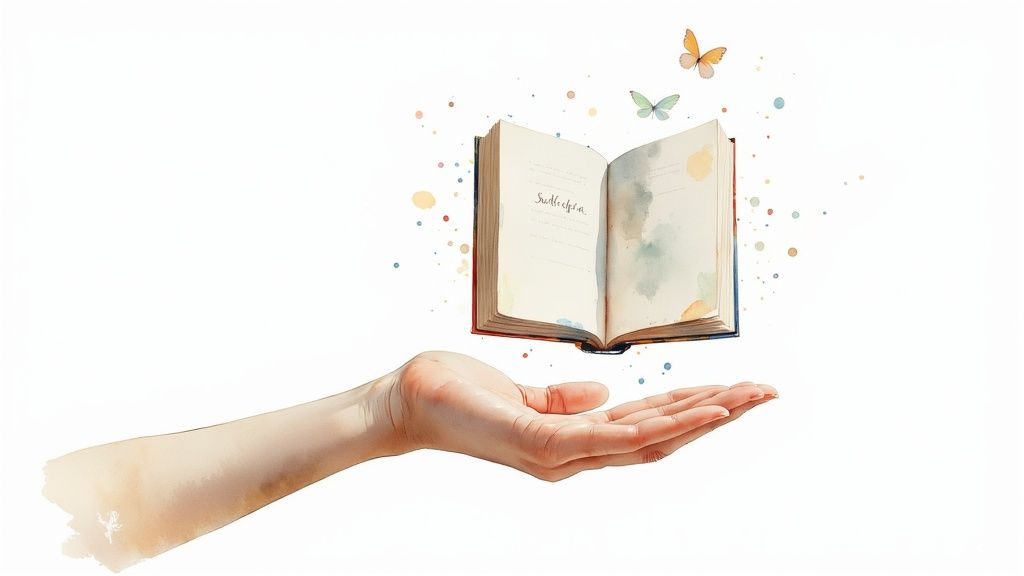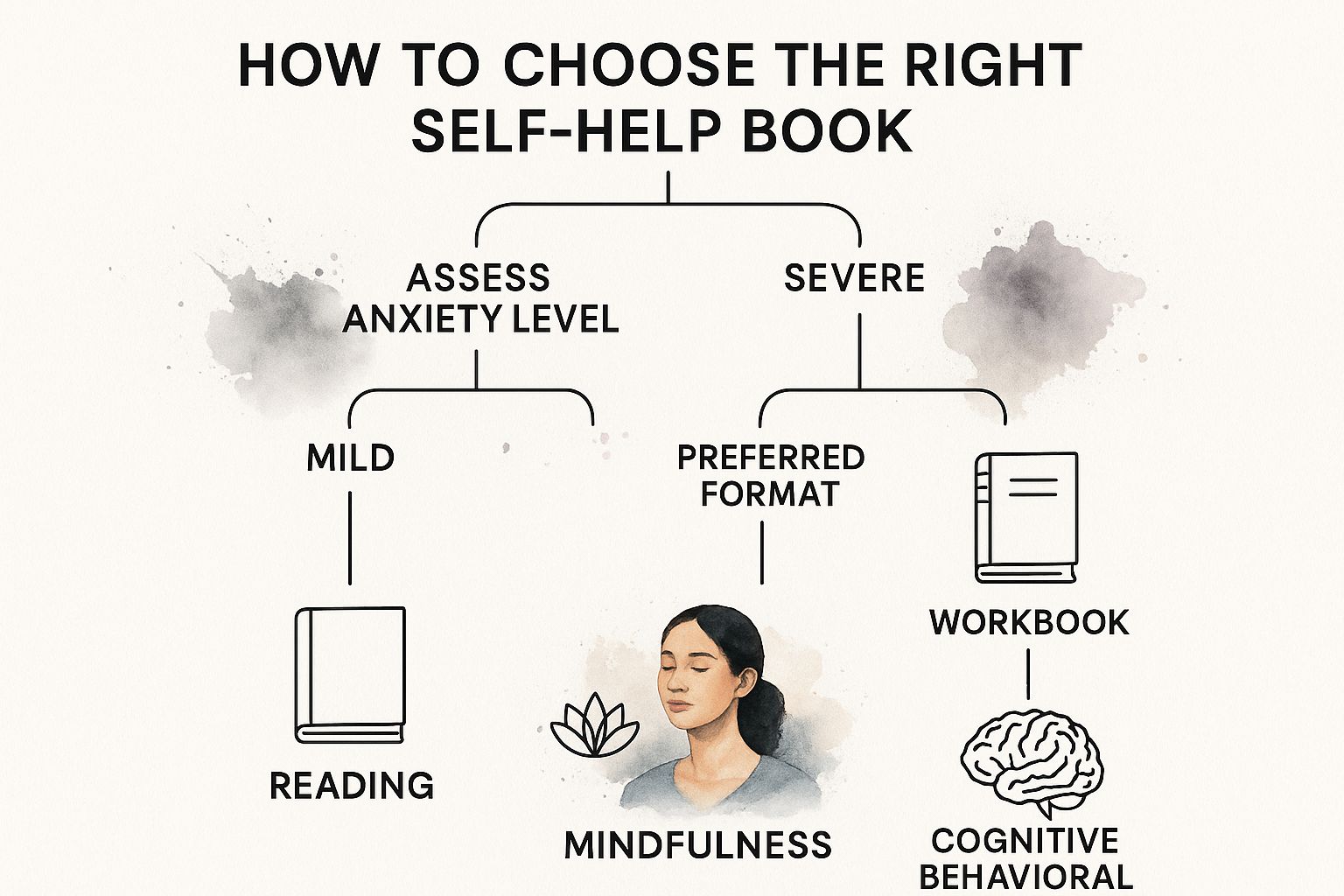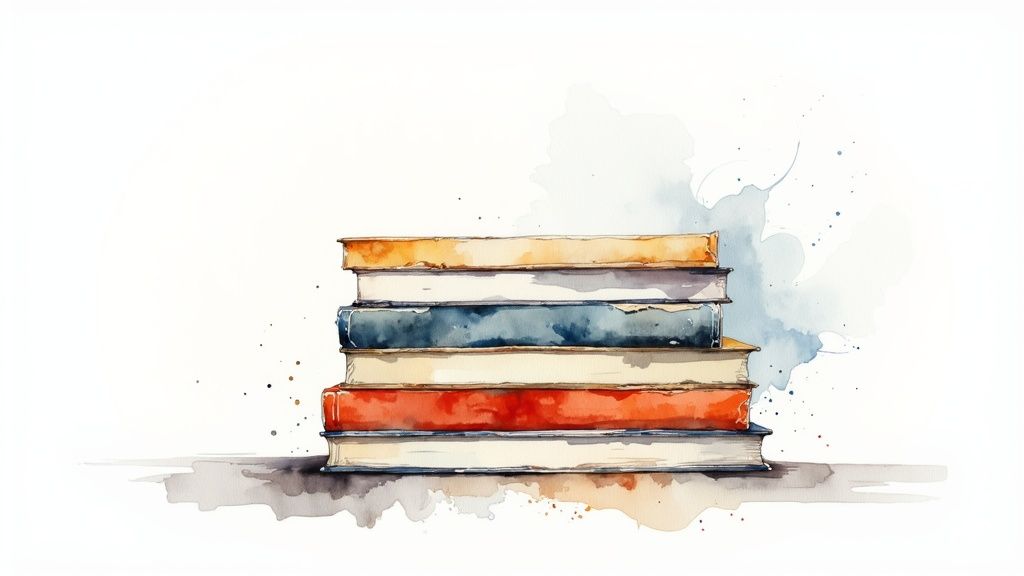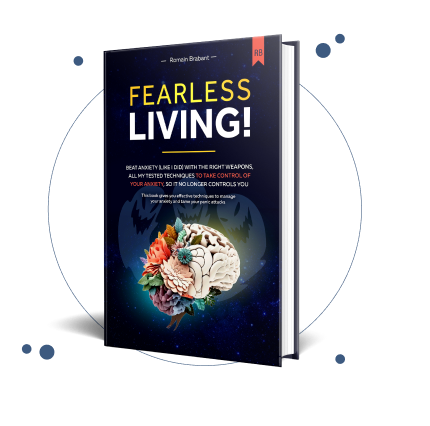
The right self-help books for anxiety are more than just pages with words—they're powerful, accessible roadmaps for anyone looking to reclaim their life from the grip of panic and worry. Think of them less like books and more like trusted guides, filled with proven strategies to help you build a calmer, more peaceful existence and a future free from fear.
Finding Hope When Anxiety Feels Overwhelming

If you're reading this, chances are you're tired of the constant, low-level hum of anxiety. You’re searching for relief, but more than that, you're looking for a sign—a glimmer of hope that a life free from panic isn't just a fantasy.
Let’s be clear: You are not alone in this feeling, and a calmer, panic-free future is entirely possible for you.
This guide isn't just another reading list. Instead, we’re going to explore these books as indispensable allies on your journey toward healing. They can feel like having an expert therapist and a supportive friend on call, ready whenever you need them, reminding you that recovery is within reach.
Your First Step Toward a Panic-Free Life
The path to overcoming anxiety often starts with a single, courageous step. Simply choosing to learn about these resources is that step. The real beauty of these books is their ability to translate complex psychological concepts into simple, actionable advice you can start using today to build a life you love.
They’re filled with wisdom from authors who have navigated the very same challenges you’re facing and have come out the other side. And you’re not the only one seeking this kind of guidance.
The global self-help market is projected to hit $13.2 billion by 2025, a boom driven largely by a collective desire for effective, evidence-based tools to manage anxiety. This surge just goes to show how many people are turning to books to find real-world solutions and hope for a better tomorrow.
The most important thing to remember is that healing is a journey, not a destination. These books provide the map and the tools, but you are the one steering the ship. You have the power to change your relationship with anxiety and truly heal.
What You Can Expect to Gain
By diving into the right self-help books, you can start to see tangible changes in your daily life. They’re empowering because they give you:
- Understanding: You'll finally learn the "why" behind your anxiety, demystifying the physical sensations and spiraling thoughts that feel so overwhelming.
- Practical Tools: Get access to concrete exercises and coping mechanisms designed to calm your nervous system and build lasting resilience.
- A Sense of Control: Discover how to spot and challenge negative thought cycles, replacing them with healthier, more balanced perspectives that support your peace.
- Renewed Hope: Realize that countless others have walked this exact path and found their way to a life defined by peace, not panic. Healing is possible.
This journey is about so much more than just managing symptoms; it’s about reclaiming your life. For those looking for structured guidance beyond reading, a program like the Anxiety University course can provide an extra layer of support. This guide will show you how to start that journey, feel understood, and build the confidence that a solution is truly within your reach.
How Books Can Rewire Your Brain for Calmness

Ever wondered if something as simple as reading a book can actually create lasting change when you're battling anxiety? It’s not magic—it's science. Your brain has a remarkable quality called neuroplasticity, which is just a technical way of saying it can physically change and build new connections based on your experiences. This is the foundation of hope.
Think of your anxious thought patterns like well-worn trails in a dense forest. Over years of use, these paths have become your brain's automatic route, making worry and panic the default response. It's an efficient habit, but a destructive one.
Self-help books for anxiety are like a new map and compass. They don’t just tell you to "stop worrying"; they guide you in forging fresh, calmer pathways, giving your brain an alternative, more peaceful route to take.
From Anxious Loops to Intentional Calm
The best books break down proven therapeutic methods into simple, actionable steps you can actually use to heal. Instead of hitting you with clinical jargon, they translate powerful strategies into exercises that fit into your daily life.
By consistently engaging with these techniques, you're not just distracting yourself. You're actively rewiring your brain's default responses. You are, quite literally, teaching it a new way to live peacefully.
"Your brain is a dynamic, living system that is constantly changing its structure and function in response to your experiences. This means you have the power to consciously shape your mind and cultivate a state of inner peace."
It’s not about erasing old thoughts, but about building stronger, more resilient new ones. Every time you challenge a negative assumption or use a grounding technique from a book, you reinforce a new neural connection. Over time, that calm pathway becomes the easier, more natural one for your brain to follow.
The Science Behind the Pages
Many of the best self-help books for anxiety are built on the solid foundations of evidence-based therapies. These aren't just collections of encouraging words; they're structured systems designed to change how you think, feel, and behave. While these books are incredible tools, it's also helpful to understand the full landscape of professional support. You can learn more about these approaches in our guide to psychotherapy for anxiety.
The techniques you'll find often come from established practices like:
- Cognitive Behavioral Therapy (CBT): This approach helps you catch, challenge, and reframe the distorted thought patterns that fuel anxiety. A book can give you worksheets to identify catastrophic thinking and replace it with realistic, hopeful thoughts.
- Acceptance and Commitment Therapy (ACT): This method flips the script by teaching you to stop fighting your anxious thoughts. Instead, you learn to accept their presence without letting them drive, allowing you to commit to actions that align with your values and lead to a fulfilling life.
- Mindfulness-Based Stress Reduction (MBSR): Rooted in the power of the present moment, this practice encourages you to observe your thoughts without judgment. Books in this category are often filled with guided meditations and simple breathing exercises to bring you back to a place of peace.
Building Resilience One Chapter at a Time
The journey to a calmer life is gradual, built on small, consistent actions. Reading a book is the first step, but applying its lessons is where the real healing begins. You’re not just a passive reader; you're an active participant in your own recovery.
Think of each chapter as a workout for your brain. The first time you try a new technique, it might feel awkward, but with repetition, that mental "muscle" grows stronger.
This process gives you tangible proof that you are not powerless. By arming yourself with knowledge and practical tools, you build a profound sense of self-efficacy. You learn that while you can't control every external event, you absolutely can learn to manage your response to it. That realization is the cornerstone of hope and the start of a life where you are in charge—not your anxiety.
How To Choose The Right Book For Your Journey
Walking into the self-help aisle can feel as overwhelming as the anxiety you’re trying to manage. With thousands of books all promising a calmer mind, just picking one can feel like a high-stakes decision. But look at it this way: this is your first real chance to take back control and choose a path toward hope.
Think of it like hiring a personal guide for a long journey. You wouldn’t just pick the first person you see. You’d want to know their approach, their background, and whether you actually connect with them. The same logic applies here. You're choosing a voice that will hopefully guide you toward healing, so it's worth being intentional.
Start With The Author’s Expertise
Before you even read the back cover, flip it over and find out who wrote the book. Are they a licensed psychologist, a psychiatrist with an MD, a researcher, or someone sharing their personal story? Both paths can offer incredible value, but it's crucial to know which one you're walking.
An author with a professional background in mental health—like a PhD, PsyD, or MD—is far more likely to ground their advice in evidence-based methods. We're talking about proven frameworks like Cognitive Behavioral Therapy (CBT) or Acceptance and Commitment Therapy (ACT). This means the tools you're learning have been tested, researched, and shown to help people heal.
But the self-help world is a crowded space, and not all bestsellers are written by clinical experts. In fact, a 2025 survey of 22 popular advice books found that only three were written by authors with advanced degrees in psychology or medicine. That’s why it pays to be a discerning reader when you're looking for a guide to support your mental health.
This simple chart can help you figure out what type of book might fit best with your needs and the way you learn.

As you can see, your own preferences—like whether you enjoy personal stories or prefer hands-on exercises—play a huge role in finding the right book.
Match The Format To Your Learning Style
Beyond who wrote the book, think about how you actually learn. Self-help books for anxiety come in a few different flavors, and picking the right one can be the difference between a book that collects dust and one that changes your life.
- Interactive Workbooks: These are perfect if you learn by doing. They're packed with prompts, checklists, and exercises that get you to actively challenge anxious thoughts and build new, hopeful habits.
- Science-Based Guides: If you're the kind of person who needs to understand the "why" behind your feelings, these books are for you. They break down the neuroscience and psychology of anxiety, giving you a powerful understanding that what you're experiencing is manageable and treatable.
- Inspiring Narratives: Sometimes, the most helpful thing is just knowing you’re not the only one. Memoirs and personal stories create a sense of solidarity and hope, showing you a real, relatable path through recovery.
The same principles for finding a resonant theme in a book for yourself often apply when choosing one for a group. You might find some interesting parallels in guides like these 10 Best Books for Book Clubs to Spark Conversation.
Which Type of Anxiety Book Is Right for You?
Feeling stuck? This table breaks down the different formats to help you find the best match for your personality and goals.
| Book Type | Best For… | Key Feature | Example Approach |
|---|---|---|---|
| Workbooks | Hands-on, action-oriented learners who want to practice skills immediately. | Structured exercises, worksheets, and self-reflection prompts. | Guides you to identify and reframe your specific anxious thoughts through written exercises. |
| Science-Based Guides | Analytical thinkers who want to understand the biological and psychological roots of anxiety. | In-depth explanations of neuroscience, evidence-based therapies, and research. | Explains how the amygdala triggers the fight-or-flight response and offers techniques to regulate it. |
| Narratives/Memoirs | Readers seeking connection, validation, and inspiration from personal stories. | Relatable storytelling, emotional resonance, and shared experiences. | Shares the author's journey of overcoming panic attacks, offering hope and practical insights. |
Ultimately, the "best" book is the one you'll actually use. Be honest with yourself about what you're most likely to engage with—whether that's filling out a worksheet or getting lost in a compelling story.
Read Reviews With A Critical Eye
Finally, use reviews as a tool, but do it wisely. Scroll past the generic five-star ratings and hunt for the detailed comments that explain why the book was helpful.
Look for comments that say things like, "The breathing exercise on page 52 helped me stop a panic attack," or "The chapter on reframing negative thoughts changed my perspective." These specific testimonials are far more telling than vague praise.
Reviews like that are a sign that the book offers concrete, actionable advice that real people have put into practice to reclaim their lives. This final step isn't just about finding a good book; it's about finding the right book for you. By choosing your guide carefully, you're making a hopeful investment in your own well-being and taking one of the most important anxiety recovery steps on your path to a calmer life.
Exploring Different Types of Self-Help Books

Walking into the self-help books for anxiety section can feel like standing in a massive library without a map. Every cover promises a way out of the fog, but not all paths are created equal. The secret to finding a book that actually helps is knowing they’re designed for different needs, learning styles, and emotional starting points.
This is about more than just picking a title that sounds good. It's about finding a resource that speaks your language and gives you the specific support you need in this moment. Hope isn't about finding the one "right" solution; it's realizing there are many, and one of them is a perfect fit to guide you toward healing.
Think of it like a toolkit. You wouldn't use a hammer when you need a wrench. In the same way, the right book depends on what you're trying to build—practical skills, a deeper understanding, or just the powerful feeling of not being so alone.
Interactive Workbooks: The Hands-On Approach
For anyone who feels an urgent need to do something about their anxiety, interactive workbooks are a godsend. These aren't books you just read; they're active guides that pull you into the process of your own healing.
They're often structured around proven therapeutic models like Cognitive Behavioral Therapy (CBT) or Acceptance and Commitment Therapy (ACT). Instead of just describing the theories, they give you the prompts and space to apply them directly to your own life.
This is incredibly empowering. It shifts you from feeling stuck to actively solving problems. Finishing even a small exercise is a real win—a tangible piece of proof that you have the power to change how you think and feel, one page at a time, building a hopeful path forward.
Science-Based Guides: The “Why” Behind the Worry
Do you find comfort in understanding how things work? If you're the type who wants to know the mechanics behind your anxiety—the neuroscience, the psychology, the biology—then science-based guides are for you.
These books pull back the curtain on anxiety, explaining what’s actually happening in your brain and body when panic or worry takes over. They break down concepts like the amygdala's role in the fight-or-flight response or how neuroplasticity lets you carve out new, calmer neural pathways.
This isn't just trivia; it's a powerful tool for self-compassion.
Understanding the science behind your anxiety helps you see it not as a personal failing, but as a predictable (and manageable) biological process. This shift in perspective can be the first step toward reclaiming your sense of control and hope.
When you know why your heart is racing or your thoughts are spiraling, the experience becomes less terrifying. It feels more like a puzzle you have the instructions to solve, assuring you that a solution exists.
Personal Memoirs: The Power of Shared Stories
Sometimes, the most healing thing in the world is the quiet, profound realization that you are not alone. Memoirs from people who have walked through the fire of anxiety and made it to the other side offer a unique kind of comfort and hope.
These books deliver something clinical guides can't always capture: the raw, honest, and deeply human side of recovery. They validate your feelings and show you that a life beyond panic isn't just a theory—it's a lived reality for other people, and it can be for you too.
Reading someone's story can feel like a conversation with a friend who just gets it. That sense of connection can be a lifeline, especially on days when anxiety makes you feel completely isolated. They are a constant reminder that healing is possible, even if the path isn't a straight line.
This trend of seeking out authentic voices is reflected across the market. Analyses in 2025 show that anxiety relief is still a major theme in self-help. Publishers are increasingly blending science with relatable techniques, as seen in popular titles like 'The Let Them Theory' or 'Atomic Habits'. Books like 'Beyond Anxiety' by Martha Beck, often retailing for under $20, show that readers are eager for accessible mental health tools that connect on a personal level. You can read more insights about the top-selling self-help books.
Ultimately, the best self-help books for anxiety are the ones that meet you exactly where you are. Whether you need practical exercises, intellectual understanding, or emotional connection, there’s a book out there waiting to guide you toward a brighter future.
Turning Reading into Real-Life Recovery
Picking up one of the many self help books for anxiety feels like a hopeful first step, and it is. But the real transformation doesn't happen until you move from just reading the words to actually doing the work. A book sitting on your shelf is pure potential; the recovery part begins the moment you put its lessons into practice.
Think of your book as a personal trainer for your mind. You wouldn't expect to get stronger just by owning a set of weights, right? The progress comes from lifting them, one rep at a time. It’s the same with anxiety. Lasting relief comes from consistently applying the techniques you learn, creating a foundation for a panic-free life.
This is all about building a bridge between the wisdom on the page and your day-to-day reality. It’s about taking abstract concepts and turning them into concrete tools you can grab when your heart starts racing or your thoughts begin to spiral, knowing you have what it takes to find calm again.
From Reader to Active Participant
To make a real difference, you have to get your hands dirty. Passively letting the words wash over you is nice, but it rarely leads to any lasting change. Instead, you need to approach your book like a student who's determined to master a new skill for a better life.
Get involved with the text. Grab a highlighter and mark sentences that spark hope. Keep a notebook nearby to jot down key insights, answer the author's questions, or reflect on how a concept connects to your own life. This interaction is what makes the information stick.
The goal isn't just to finish the book; it's to internalize its message. By taking notes and highlighting passages, you're creating a personalized roadmap of the most important ideas—a quick-reference guide you can turn to on tough days.
Start Small and Build Momentum
One of the biggest mistakes people make is trying to do everything at once. That approach almost always leads to feeling overwhelmed, which is the last thing you need when you're already dealing with anxiety. The key to sustainable change is to start small.
Seriously. Choose just one new technique from your book. It could be a simple five-minute breathing exercise, a method for challenging a single negative thought, or a small mindfulness practice. Then, commit to practicing just that one thing for a week.
Once that action starts to feel more natural, you can layer in another. This gradual approach builds momentum without adding pressure. Remember, healing is a marathon, not a sprint. Each small step forward is a victory that reinforces your ability to manage anxiety and builds a foundation of hope. If you're looking for simple, effective techniques to start with, explore our guide to breathing exercises for anxiety.
Integrating Reading into a Holistic Plan
Your self-help book is a powerful tool, but it works even better when it’s part of a bigger wellness strategy. You can amplify its benefits by connecting what you read to other healthy habits that support your mental well-being. Think of the book as the central hub of your recovery plan.
Here are a few ways to weave its lessons into your daily life:
- Schedule Your Practice: Just like you’d schedule a workout, block out time to do the exercises in your book. Even 15-20 minutes a day can make a huge difference.
- Connect to Movement: If your book talks about the mind-body connection, pair your reading time with a gentle walk or some light stretching. It helps put the ideas into immediate physical practice.
- Share Your Insights: Talk about what you're learning with a trusted friend, family member, or therapist. Explaining a concept to someone else is a fantastic way to make it click for yourself.
When you treat your book not as a one-time read but as a lifelong companion, you give yourself a resource you can return to again and again. It becomes a reliable anchor, reminding you that you have the tools, the strength, and the hope to build a calmer, more peaceful life.
Your Next Chapter: A Future Free from Panic
You started this journey looking for hope, and now you have a roadmap—one filled with real tools and fresh ways of thinking. The noise of anxiety can feel deafening, but the quiet wisdom inside these self-help books for anxiety can show you a clearer path to peace.
If you take anything away from this guide, let it be these simple, powerful truths. Anxiety is a treatable condition, not a life sentence. The books and strategies we've walked through are proven, accessible allies in your corner.
And most importantly? You already have the strength you need to walk this path and heal.
Taking That First Courageous Step
The single most important step you can take is the one you decide on right now. Don't feel like you have to tackle everything at once. That's a recipe for overwhelm.
Instead, just pick one book that spoke to you. Or one small technique you read about here. Commit to trying just that one thing this week.
That small act is a powerful declaration. It's you telling yourself that you’re ready to reclaim your life from the grip of worry and panic. Every tiny action builds momentum, creating a positive loop that makes the next step feel that much easier.
Remember, a calmer, panic-free future isn't just some hopeful dream—it's an achievable reality you can start building today. You are more than capable, and your journey to peace has already begun.
This was never about finding a magic cure. It's about consistently showing up for yourself with tools that work. You're the author of your own story, and by choosing to engage with these resources, you're turning the page to a new chapter—one defined not by fear, but by freedom and hope.
Common Questions About Self Help Books for Anxiety
Starting a journey with a self help book for anxiety is a big step, and it’s totally normal to have questions. You might be wondering if a book alone can really move the needle, or what to expect once you start reading. Getting clear on these things sets you up with realistic hope, making sure you feel empowered, not discouraged.
A big one I hear a lot is: Can a book actually be enough to beat anxiety? The honest answer is that these books are incredibly powerful tools, but they work best when you become an active partner in your own healing.
Think of it like this: a self-help book is the blueprint for a calmer life. It gives you all the instructions and diagrams, but you're the one who has to pick up the tools and build it, piece by piece. The real magic happens when you start applying the techniques and realize you have the power to create lasting change.
Setting Realistic Timelines for Healing
Another common concern is how long it takes to actually feel a difference. There’s no magic number here—healing is a deeply personal process. Progress is usually gradual, more like a series of small wins than one giant leap.
The first sign might be subtle. Maybe you handle a stressful meeting a little better than you did last month. Or maybe a wave of panic rises, but it feels just a bit less intense. Those are the victories that prove healing is happening.
It's so important to be patient and kind to yourself through this. Consistency beats speed every time. A study on self-help readers found that less than 5% of people actually applied the advice from a book they were given. That number says it all: the real change comes from the small, daily efforts to practice new habits and ways of thinking. The goal is steady progress, not overnight perfection.
What if a Book Isn't Working for Me?
It’s also completely okay if a certain book just doesn't click with you. This isn’t a sign that you’ve failed; it just means you need a different map. Just like one therapist isn't the right fit for everyone, one book won't work for every single person.
If you feel stuck, see it as a chance to pivot. Maybe you can switch from a dense, science-heavy guide to an interactive workbook that feels more hands-on.
Remember, self-help books are just one tool in a much larger wellness toolkit. They offer fantastic strategies, but it's also crucial to know when it might be time for exploring professional therapy options for anxiety as an added layer of support.
Knowing that help is out there can be incredibly reassuring. You can also dive into some anxiety statistics to see just how common these feelings are—you’re definitely not alone. The journey to a panic-free life has many paths, and there’s always another one to try. Your future can be calm and free.
At The Anxiety Checklist, we believe everyone deserves to live a life free from the constraints of anxiety. Our Fearless Living system provides a practical, step-by-step guide to help you build resilience and reclaim your peace. Get your personalized toolkit and start your journey to a calmer future today.

